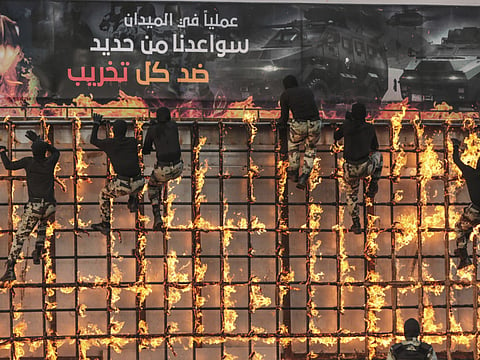Saudi Arabia warns against Haj unrest as pilgrims pray for peace
Pilgrims say they feel safe in Makkah despite concerns about disease, war and terrorism

Makkah: Saudi Arabia has warned Muslim pilgrims attending next week’s Haj in Makkah to avoid exploiting Islam’s annual gathering for political reasons, reflecting its worry that turmoil in the region may prompt attacks or damaging displays of discord.
Wearing the clothes and speaking the languages of dozens of nations, hundreds of thousands of pilgrims flocked to Makkah’s Grand Mosque for Friday prayers in a show of religious harmony in a year when the region’s Muslim states are riven by conflict.
“The security forces are ready to confront any irresponsible behaviour that might pollute the purity of Haj or endanger the lives of the guests of Allah,” Interior Minister Crown Prince Mohammad Bin Nayef was quoted as saying by state media.
The turbulence and sectarian infighting that has plagued Arab countries since the 2011 uprisings has grown even more acute this year, as Yemen and Libya joined Syria and Iraq in plunging into civil war.
In Saudi Arabia, three suicide bombings of mosques by sympathisers of Daesh (the self-proclaimed Islamic State of Iraq and the Levant) this year have proved that even Muslim places of worship are at risk of attack by militants.
In the Grand Mosque, worshippers of different nationalities said they hoped the Haj would provide a chance for Muslims to set strife aside.
Ali Saeed, who arrived in Saudi Arabia from Jordan after escaping Syria’s civil war, prayed rival leaders would “come back to their senses and stop shedding innocent blood”. “Will it ever end? God knows. I hope all our leaders can come to Makkah and share the same faith as all those people do,” he said.
As they walked in groups, some joined hands and others wore colourful scarves bearing the name of their country to avoid getting separated or lost. Some pushed relatives in wheelchairs or helped the elderly in the crush.
“I invite all people from Iran and other Muslim countries to come together in Makkah and experience the spirituality,” said Abdullah Rahmani, a grey-bearded Iranian.
In past years, the Haj has drawn around 3 million pilgrims.
This year and last, Riyadh cut back on numbers — enforced through strict visa rules and a ring of checkpoints around the city — to prevent dangerous overcrowding during expansion works.
About 1.2 million have arrived so far this year.
From all races and ages, they flocked into the Grand Mosque, where they prayed — some silently in tears and others loudly in groups carrying their countries’ flags.
The crashing of a crane into the Grand Mosque during a storm last week, killing 107, demonstrated the extent of those dangers. But the wider programme of construction over the past 15 years has helped stop repeats of once-common deadly stampedes.
The crane accident has not stopped pilgrims carrying out their rituals.
“Do you see the number of people here? Do you think they are fearful? It is quite the opposite. People here have faith in God and perceive those who died as martyrs,” said Amin Al Rahman of Bangladesh.
The crane was one of several on a multi-billion-dollar expansion to accommodate increasing numbers of faithful.
Samira Abdul Wahab, a pilgrim from Sudan who had just finished circling the Kaaba, which all Muslims face to pray, called the Grand Mosque “the safest place in the world”.
The Kaaba is now barely visible amid the surrounding construction works.
Tawaf, or circumambulating the Kaaba, is a ritual of the pilgrimage performed by the pilgrims who come from all over the world.
A challenge again facing the Haj is potential transmission of the deadly Middle East Respiratory Syndrome coronavirus (MERS-CoV).
The capital Riyadh saw a jump in infections last month.
But Health Minister Khalid Al Falih said all pilgrims are so far in “very good, if not excellent health.”
Saudi Arabia is the country worst affected by Mers, with 528 deaths since the virus appeared in 2012.
The health ministry has mobilised 25,000 additional medical staff to support the Haj, but says there has never been a case of Mers among pilgrims.
And despite the troubled backdrop, worshippers spoke of their elation at attending an event that marks the peak of their spiritual lives.
“We feel tremendous. We’re very, very excited,” said Fawzy Abdul Rahman, 59, from the Philippines.
“We’re praying for our kids,” he said, holding his wife’s hand and melting into the crowds.
Sign up for the Daily Briefing
Get the latest news and updates straight to your inbox



